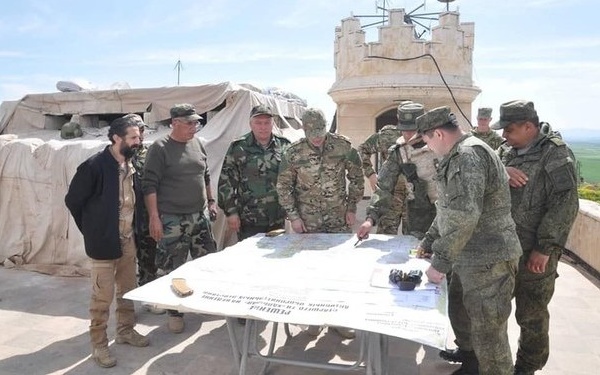Russian officers in northern Hama Province, Syria, June 2019
Trying to hold part of Idlib Province in northwest Syria, Russia is bolstering pro-Assad forces before a meeting between Vladimir Putin and Turkish President Recep Tayyip Erdoğan in Moscow on Thursday.
Flight data and monitoring of shipping in the Bosphorus Strait in northwestern Turkey shows Russia began escalation of naval and airborne deliveries to Syria on February 28.
On that day, Turkey launched attacks on hundreds of pro-Assad targets, in retaliation for the killing of 36 Turkish troops by a Russian or regime strike the previous day.
Moscow was concerned that Turkey might close the Bosphorus to Russian warships and close Turkish airspace to Moscow’s warplanes, even though a Turkish officialsaid there was no plan to close the strait.
Russia has sent five warships toward Syria within six days far beyond its usual supply line of one or two warships per week. Three of the ships traveled without any announcement by Moscow.
Since February 28, the Russian military has flown at least five passenger and cargo planes to Syria.
A “Turkish security official” cautioned, “Russia is conducting a serious build-up near Hmeymim the Russian airbase in western Syria]. These are steps that may damage the positive atmosphere that could be found before tomorrow’s meeting.”
Turkey intervened last month against the 10-month Russia-regime offensive in northwest Syria, escalating its involvement from February 28 with the destruction or capture of scores of tanks, other armored vehicles, air defense systems, multiple rocket launchers, and heavy weapons.
Turkish support enabled rebels to reclaim territory in southern Idlib Province. But ahead of the Putin-Erdoğan meeting, Moscow pushed back ensuring a pro-Assad offensive reoccupied Saraqib, at the junction of the Damascus-to-Aleppo M5 and cross-Idlib M4 highways.
See also EA on Dublin NewsTalk: Humanitarian Crisis in Syria’s Idlib Province
The Reality of Syria: No One “Wins”
A Deal to Split Idlib?
Erdoğan said on Wednesday that he was expecting “to immediately reach a ceasefire in the region” in his talks with Putin.
He did not repeat his demand, originally with a February 29 deadline, for Assad regime forces to leave Idlib Province.
Defense Minister Hulusi Akar said, “Our views, opinions and demands will be conveyed to Putin by our President at the highest level. A solution will be sought. Our objective is to reach a solution, peaceful and political solutions.”
Some analysts foresee an agreement to partition Idlib, which has about 3 million residents and has been held by the opposition since spring 2015.
Turkey has also proposed joint control of airspace and ground patrols with Russia.
But Akar declared that Erdoğan will seek a return to a “de-escalation zone” around northern Hama and southern Idlib, declared with Putin in September 2018 but shattered by the Russian-regime offensive.
“Our expectation from Russia as a guarantor country is to fulfill its responsibilities, stop the regime’s attacks and use its influence over the regime to return to the borders set in the Sochi agreement,” the Defense Minister said.
The Russian-regime offensive has killed almost 2,000 civilians, wounded thousands, and displaced more than 1 million as it seized almost all of northern Hama and part of southern Idlib Provinces.
The displaced are trapped between the Russian-regime attacks and Turkey’s closed border. Ankara, which hosts more than 3.6 Syrian refugees, blocked further entries in 2016.
Concerned about the mass gathering of the displaced near the border, many of them without shelter, Erdoğan began warning Russia and the regime in late January that the situation could not be tolerated.
As Turkey launched its attacks on regime targets last Friday, it also encouraged refugees to leave the country for Greece, but Greek border police have blocked movement with tear gas and stun grenades.


Turkey folded…